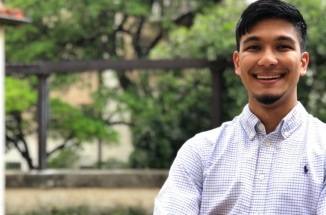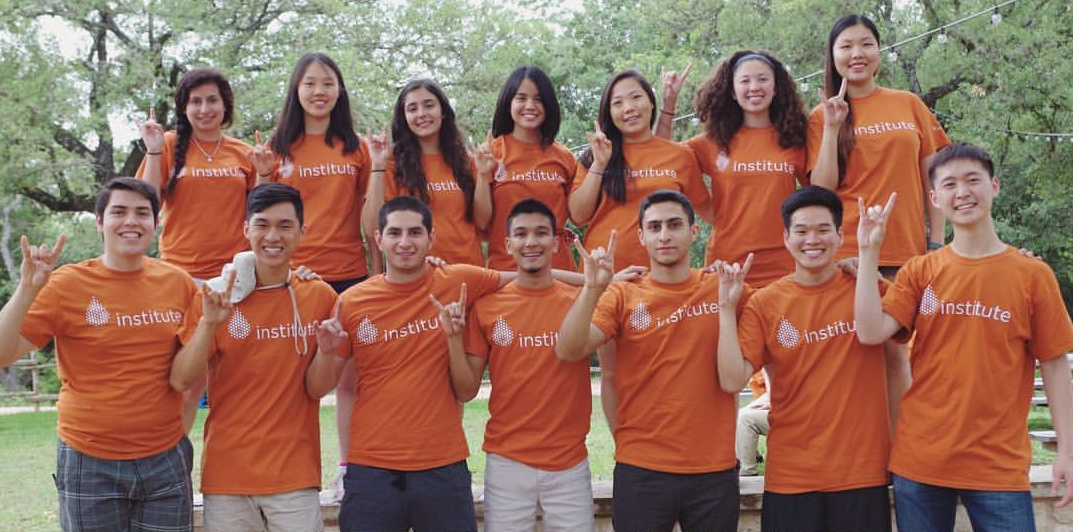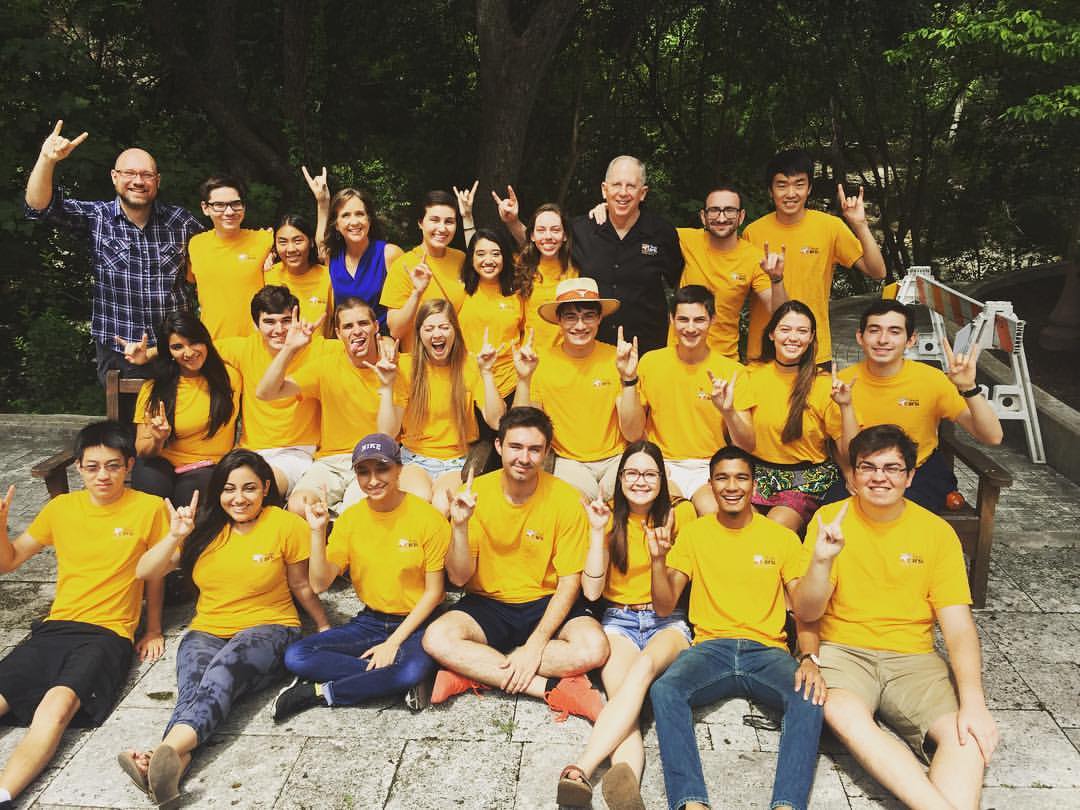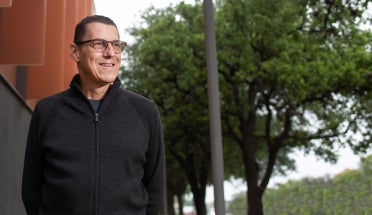
Student and Entrepreneur Finds Myriad of Opportunities at UT
- Apr 13, 2018
The University of Texas at Austin is home to thousands of international students from all over the world. Some countries have larger representation at UT, but there are only 6 from Trinidad and Tobago, and one of them co-founded the Energy Olympiad, which took place in early February.
Hailing from San Fernando, Trinidad and Tobago, Himchand Persad is enrolled in UT's Petroleum Engineering Honors Program. His passion for learning, his interest in energy technology, and his entrepreneurial spirit inspired him to study in the United States.
While trading 80-degree Caribbean winters for the erratic Texas' cold fronts was difficult at first, he thinks that the warmth of Austin's residents and the city's entrepreneurial spirit have made up for the low temperatures. The university's commitment to make a global impact also eased his transition to the Forty Acres.
In addition to his coursework, Persad serves as president of the Opportunity Foundation and as treasurer for the Society of Petroleum Engineers (SPE). He is also a member of Pi Epsilon Tau Honor Society, American Association of Drilling Engineers (AADE), and the Energy Olympiad. The innovation-based competition was held in partnership with the UT Energy Institute and is centered around the United Nations Sustainable Development Goals (SDGs), particularly those related to energy.
The event highlighted the prestige of the University of Texas at Austin as a flagship energy institution whilst simultaneously giving youth an opportunity to have a voice in energy related issues. It also opened its doors to high school students from the Youth Energy Summit.
Persad who is also pursuing a minor in Business, expects to graduate in May 2019. He shared with us his reasons for choosing UT Austin and details of his experience.
"Enrolling at The University of Texas at Austin was an easy decision"
Why did you choose to pursue your undergraduate degree in the U.S.?
Back at home, studying abroad in the U.S. or U.K. is perceived as a great, but incredibly competitive, opportunity. Despite growing up in the tiny paradise islands of Trinidad and Tobago, I was thrilled by the idea of casting a “global net” early on. After witnessing reluctance to the adoption of energy technology as well as the lack of avenues for youth to initiate change, I saw the U.S. as an opportunity to tackle problems by working alongside individuals with diverse perspectives, and who were not only willing to challenge the status quo, but even my own ideas.
Why did you choose the University of Texas at Austin?
Enrolling at The University of Texas at Austin was an easy decision. It is a world-class energy institution with groundbreaking research and renowned faculty. I thought to myself that an environment of budding energy pioneers and ambitious entrepreneurs across many industries would help me grow, and facilitate access to even broader horizons, such as consumer technology, water or real estate.
What surprised you the most about being in Austin and in UT?
Coming from 80-degree Caribbean breezes to 30-degree Austin winters was a bit of a change, but I’ve grown to enjoy it. The warmth of the city’s people made up for the cold, and Austin’s entrepreneurial culture has been captivating, almost addicting; I was surprised at how quickly I felt at home. The transition was made even easier after I realized the impact that ideas cultivated within the Longhorn community have on the world; it cemented my hope that there are many at UT who aspire to initiate global change.
What is your major? Why did you choose it?
I am currently a junior enrolled in the Petroleum Engineering Honors program with a minor in Business. My expected graduation date is May 2019. Growing up, I was immersed in the energy industry but paid little attention to it. Energy is fundamental to the economy of Trinidad and Tobago, with the energy sector accounting for over 40% of the country’s GDP. Following my computer repair business and numerous other electronics and even furniture ventures, I started to take interest in the backbone of T&T’s economy. I was inspired to change the numerous inefficiencies, particularly in the procurement services sector, as well as the culture of resistance to energy innovation; I saw an opportunity to create value and impact, and I pursued it.
My parents have promoted charity since my childhood, and during this time I became strongly motivated to help youth, particularly at orphanages in T&T; I saw the inequality but also the opportunity to inspire others to pursue education and entrepreneurship. I felt that energy had the potential to uplift communities globally, and with my entrepreneurial and philanthropic incentives aligned, I started looking at the top energy programs around the world. This lead me to the prestigious Petroleum and Geosystems Engineering Department at UT Austin.
How would you describe your experience in UT, so far?
I have a big appetite for challenges, but my closest friends at UT have prompted me to grow and be courageous in new ways. Beyond professional development and the academic UT experience, I’ve come to deeply value the friendships that I’ve built here. I’ve learned to empathize with the trials that others face day to day. I’ve developed deeper senses of humility and appreciation after learning about the sacrifices that other international friends have made to be here.
Describe your transition to UT?
As an international student, finding a job in the U.S., particularly in the petroleum industry during a historically volatile market, proved to be a challenge to say the least. However, through seminars hosted by the Texas Global, I learned of ways to be more marketable to employers, ultimately securing internship opportunities. Moreover, Texas Global ensures that students were well equipped with proper documentation and abreast of news and policy changes.
Texas Global family has been incredibly supportive, especially my advisor Tina Fiet who nominated me to attend the inaugural meeting of UT’s International Board of Advisors. This experience allowed me to witness the influence and change that Longhorns have initiated across the globe, Longhorns whose footsteps I’d like to follow.
"I’ve come to greatly value networking, not in the cliché sense, but genuinely connecting with others to offer my assistance, to seek mentorship and to simply listen to someone else’s story"
What has helped you thrive in an environment away from home?
I believe that the most disruptive and positively impactful things will be born out of collaboration between people of all disciplines and walks of life. Unlocking those ideas comes with surrounding yourself with talented people who challenge you, coupled with an unwavering personal drive to learn and succeed – this has kept me motivated even away from home.
Despite this ambition, it’s only natural that being away from home can be challenging at times. A close friend coined the phrase “Today’s a day” which he interprets to mean “despite what goals or difficulties you may have, realizing that today is a day, and an opportunity, allows you to enjoy the small things that give life meaning.” With this, I’ve strived to develop an appreciation for both the highs and lows of life, and it’s helped tremendously.
How do you stay in contact with friends and family from back home?
It’s easy to lose track of the important things while you’re at college, and I will admit that I have at times. However, I’ve dedicated time to family each week that is just as important as any other commitment. I personally believe that success in entrepreneurship, a corporate career or any path you choose is meaningless if it comes with sacrificing family and friends – and this has actively guided my priorities.
Staying in touch with my Trinbagonian roots have also been made easier through my role as president of Opportunity Foundation – an international non-profit dedicated to empowering entrepreneurs of the developing world. This initiative has allowed me to maintain strong relationships with the local T&T communities we serve.
Are you involved in any student organizations?
In addition to being president of Opportunity Foundation, I am also involved with student organizations on campus, namely the Energy Olympiad, the Society of Petroleum Engineers (SPE), the American Association of Drilling Engineers (AADE), and the Pi Episilon Tau Honor Society. I currently serve as treasurer of SPE and have chaired several committees including community outreach and fundraising.

How has your time at UT contributed to your professional development?
I’ve come to greatly value networking, not in the cliché sense, but genuinely connecting with others to offer my assistance, to seek mentorship and to simply listen to someone else’s story. I had the naive thought that as long as an idea made sense in my mind, that’s all that mattered. I’ve learned that no matter how creative or intelligent an idea is, it’s almost meaningless unless you can efficiently communicate it to others; UT has offered opportunities for me to develop this approach.
I’m very thankful to my professors, as they have promoted an inquisitive mindset, both in business and engineering classes. This has allowed me to ask the hard (and sometimes stupid) questions. Finally, my peers have encouraged me to become more resourceful, and that there is always a critical point at which intelligence plateaus and it simply takes lots of hard work to finish. Having recognized the value of the aforementioned traits, I am always seeking opportunities to refine them.
What do you enjoy most about your classes?
Generally, I enjoy the ‘cross pollination of ideas’ where concepts from unrelated sectors can be used to view problems through different lenses. My classes at UT have not only allowed me to be better equipped for industry internships, but I enjoy thinking about them as opportunities to quantize problems into segments that I understand, and others that I don’t – and then be resourceful to grasp the harder parts and attempt to see the bigger picture. There are fundamental things we learn through college, that are specific to our careers, but I believe that the real value is in learning to think and acting on it.
Tell us more about Energy Olympiad.
The Energy Olympiad is an innovation-based competition, held in partnership with The University of Texas at Austin as well as the UT Energy Institute, and is centered around the United Nations Sustainable Development Goals (SDGs), particularly those related to energy. The competition serves to highlight the prestige of the University of Texas at Austin as a flagship energy institution whilst simultaneously giving youth an opportunity to have a voice in energy related issues.
During the Longhorn Energy Summit, which targeted undergraduates at UT, students attended workshops which guided them in the ideation process and in the development of their pitch. Over an intense 24-hour period, students worked alongside mentors with backgrounds in energy research and entrepreneurship, renewable energy litigation, communications and a myriad of other disciplines that were helpful in providing guidance to develop viable energy solutions.
Similarly, high school students in the Youth Energy Summit worked with mentors to refine their energy solutions, but over an extended period of months. The final pitch day showcased finalists from both tracks of the competition as participants competed for $15,000 in cash prizes. A panel of esteemed energy professionals, entrepreneurs and legal counsel with expertise in the energy sector vetted the proposals and have continued to provide valuable guidance in potentially taking select projects to market.

How did you get involved in Energy Olympiad what is your role?
The Energy Olympiad was only a thought just over a year ago. A close friend, Karan Jerath, reached out with the simple idea of an energy innovation competition. We had no funding, institutional support or any plan to say the least, just an idea. During the early days, we worked to define what the competition actually symbolized and what we aspired to accomplish. We were fortunate to have brought on very talented and driven colleagues early on, and a great team dynamic emerged organically.
I wore many hats at Energy Olympiad, as we all were focused on simply getting the event off the ground and ‘putting out fires’ as problems arose. As one of the co-founders, my primary role as Director of Corporate Relations involved overall strategy as well as the establishment of institutional support. Additionally, fundraising ventures and outreach to judges, mentors and high schoolers also lay among my duties. As Energy Olympiad moves to expand its reach and explore potential opportunities to become integrated into the Austin Technology Incubator, my role will focus on guiding the transition as the competition scales.
Do you have a most memorable moment from the event?
The potential and impact of Energy Olympiad (EO) really materialized at around midnight on the Saturday, 12 hours into the Longhorn Energy Summit. Many teams were formed with individuals whom had met each other for the very first time on the day of the event. However, as the teams collaborated and ideated, a surreal dynamic emerged between complete strangers who were focused on solving a problem greater than themselves. At that moment, I thought to myself that we really stumbled upon something – I was struck by the relationships fostered and the global potential of the initiative.
Has UT met your expectations?
I knew I was enrolling in a world-class degree taught by academic leaders of the industry, but I did not expect the diversity of study abroad initiatives, opportunities to pursue certificate programs, and to audit classes even beyond Engineering – UT has exceeded my educational expectations to say the least. There is a myriad of resources we have access to as Longhorns, and professors have proven to be incredibly receptive. My single regret is not acting earlier as an underclassman to enroll in more classes outside of my major and the engineering school; UT simply has so much to offer.
"Get uncomfortable, be dynamic, and ask the hard questions"
What is next for you?
Alongside co-founders and a valuable team of mentors, I am currently pursuing two very early stage ventures, and it’s been an accelerated and rewarding learning experience. I believe that the cost of failure at this point in life is incredibly low, and (rational and calculated) trials by fire can be the most valuable ways to learn – so I’ve jumped head first into developing these ideas. During my time left at UT, I intend to focus on building my financial aptitude, and most importantly, establishing relationships with mentors and ambitious colleagues who bring new perspectives to the table.
What are your long-term goals?
I aspire to be in a position in which I can take a long-term view on global problems such as water and energy and undertake large scale endeavors for which the consequences of success are consequential. As of now, my path there involves learning while working in a company that promotes disruptive thinking, embarking on serial entrepreneurship ventures, and potentially entering the venture capital world.
What advice would you give to an international student who is planning to enroll in UT?
I knew no one coming to UT Austin – no Trinbagonian alumni, or high school friends. I missed freshman orientation as I couldn’t get a visa in time – moved into Jester at 11PM the night before school started, and then the ride began.
I strongly recommend choosing to live in the dorms, as it’s a great opportunity to meet new people. Seek out leadership opportunities early on and become involved in organizations that your ambitions actually align with. Doing something dispassionately can be detrimental to your track record, and the organization. If your focus is getting into the job market post undergrad, I will emphasize that you begin recruiting for internships as early as possible – capitalize on the career guidance resources on campus and learn how to market yourself as an international student. Actively reach out to mentors in disciplines you’re interested in and be a mentor to others. Also, as mentioned earlier, explore classes beyond your major; college is one of the few times in our lives we will ever have the luxury to be immersed in an environment with a high concentration of opportunities to simply learn. Get uncomfortable, be dynamic, and ask the hard questions.
I am more than willing to help in any way, so feel free to reach out!
Learn more about services and programs offered to support international students at UT



